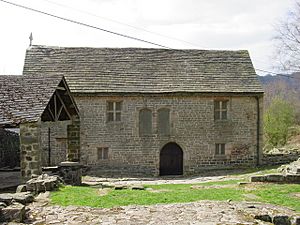Nicholas Fitzherbert facts for kids
Quick facts for kids
Nicholas Edward
|
|
|---|---|
| Born | 1550 prob. Padley, Derbyshire
|
| Died | 1612 |
| Education | Exeter College, Oxford, University of Douai |
| Occupation | Secretary |
| Parent(s) | John Fitzherbert |
Nicholas Fitzherbert (born 1550 – died 6 November 1612) was an English gentleman who was a recusant. This means he was a Catholic who refused to attend Church of England services. He worked as a secretary for Cardinal William Allen. Nicholas was found guilty of treason because of his Catholic faith during a time when being Catholic was against the law in England.
Nicholas was the second son of John Fitzherbert from Padley, Derbyshire. His grandfather was a famous judge named Sir Anthony Fitzherbert. Nicholas was also a cousin to the Jesuit priest Thomas Fitzherbert. Because of his faith, Nicholas had to spend his life living outside England. He was buried in Florence, Italy.
Contents
Nicholas's Early Life and Studies
Nicholas Fitzherbert started his studies at Exeter College, Oxford. He was a student there in 1571 and 1572. However, because of his Catholic religion, he couldn't get a degree from Oxford. Many Catholics at that time went to other countries to study and practice their faith freely.
So, Nicholas went abroad. He studied at the University of Douai and then law at the University of Bologna in 1580. While he was away from England, he was found guilty of treason in 1580. This was because he was very dedicated to the Catholic cause. He even helped raise money for the English College in Rheims, which was a school for English Catholics.
Life Abroad and Important Work
Nicholas settled in Rome, Italy. Pope Gregory XIII gave him a small allowance of ten gold coins each month. In 1587, Dr. William Allen became a cardinal. Cardinal Allen had started the English College, Douai, in 1568. Nicholas became Cardinal Allen's secretary and lived with him until the cardinal passed away in 1594.
In 1595, Nicholas translated a book called Il Galateo into Latin. This book was originally written in Italian by Giovanni della Casa. It was about good manners and how to behave well.
Nicholas also had different ideas from Robert Parsons, another important Catholic figure, about how English Catholics should manage their affairs.
Trouble at Home in Padley
While Nicholas was living abroad, his family home, Padley Hall, was taken by the government in 1589. This happened after two priests were found there by chance. The authorities were actually looking for Nicholas's father, John. The two priests were arrested and later executed for treason.
By 1603, King James I gave the Fitzherbert properties at Padley to other people. Padley Hall eventually became a ruin. However, part of the old building was restored and turned into a chapel, which you can see in the picture.
Later Life and Legacy
Nicholas Fitzherbert never became a priest or bishop. In 1607, there was a suggestion to send a bishop to England. Nicholas was mentioned as a possible candidate, but he felt he wasn't worthy of such a role.
After Cardinal Allen died, recommendations were made to Philip II of Spain about who should receive help from the King. Nicholas was among those considered.
Sadly, Nicholas Fitzherbert died by accident on 6 November 1612. He drowned while trying to cross a small stream a few miles south of Florence, on his way to Rome. He was buried in the Benedictine abbey of the Badia in Florence.
Nicholas's Writings
Nicholas Fitzherbert wrote some important books during his life:
- He translated Ioannis Casae Galathaeus, sive de Moribus, Liber Italicus (a book about manners) into Latin in 1595.
- He wrote Oxoniensis in Anglia Academiae Descriptio in 1602, which was a description of Oxford University.
- He also wrote De Antiquitate et continuatione religionis in Anglia et de Alani Cardinalis vita libellus in 1608. This book was about the history of religion in England and a biography of Cardinal Allen.
 | William Lucy |
 | Charles Hayes |
 | Cleveland Robinson |


